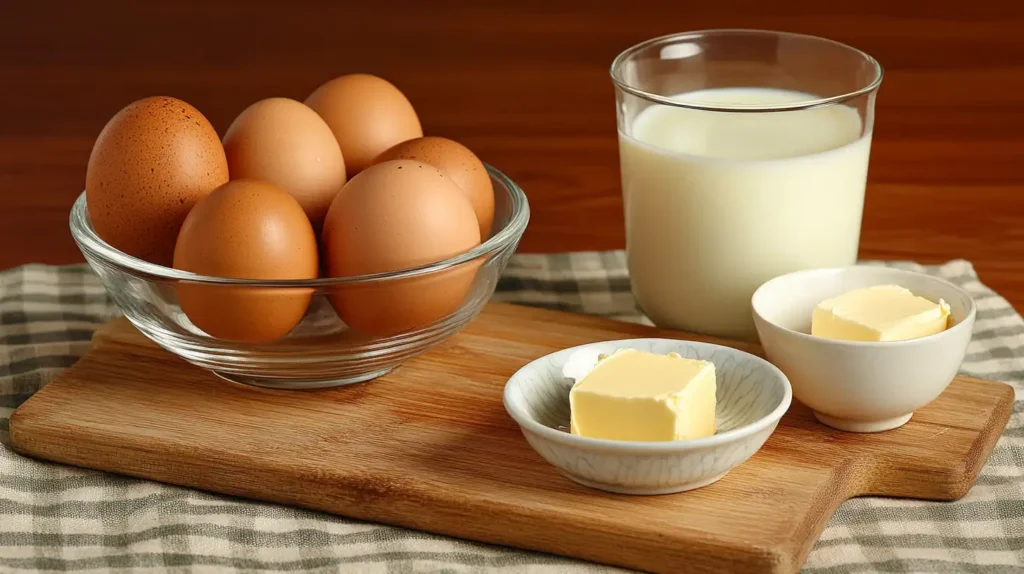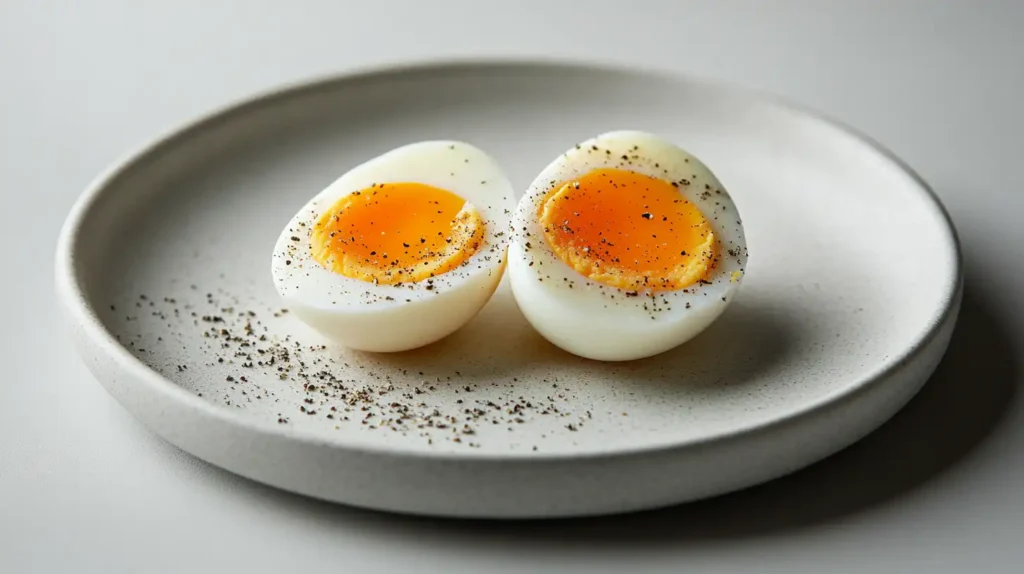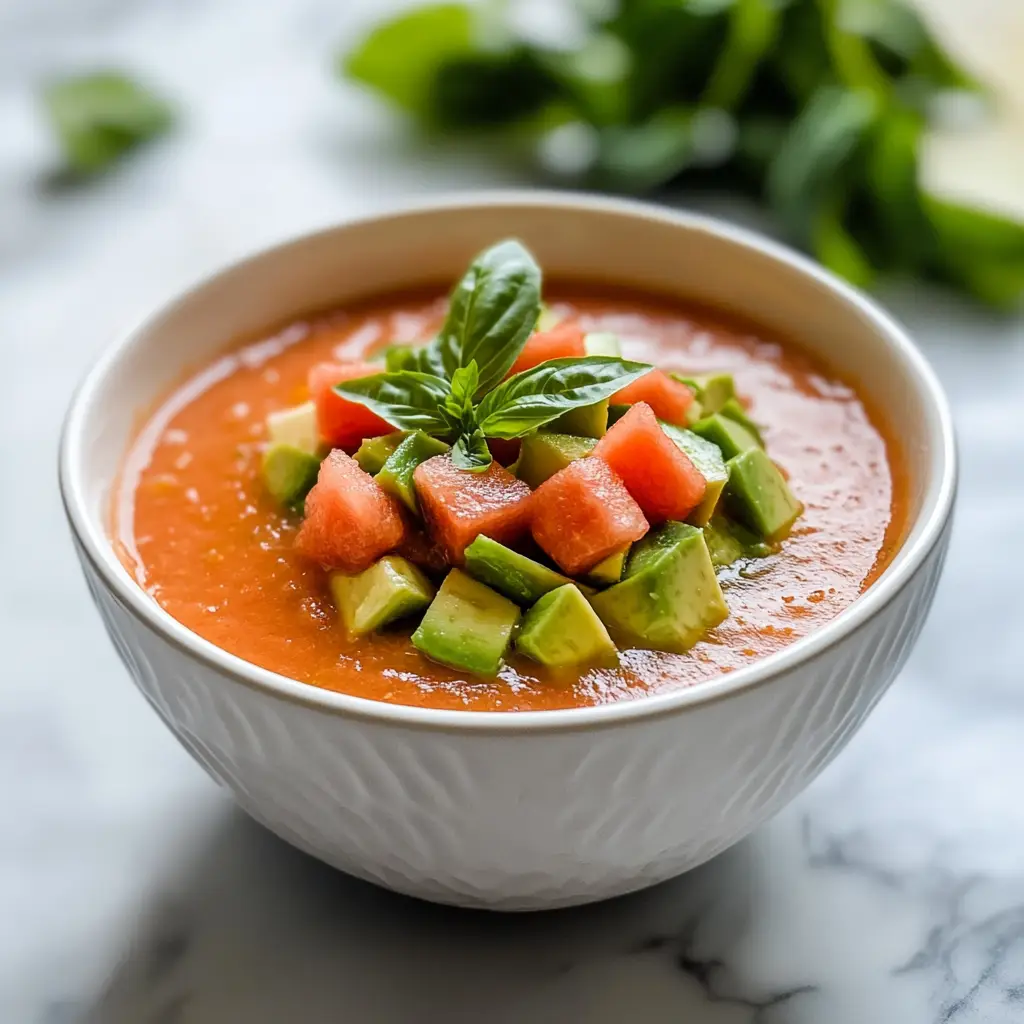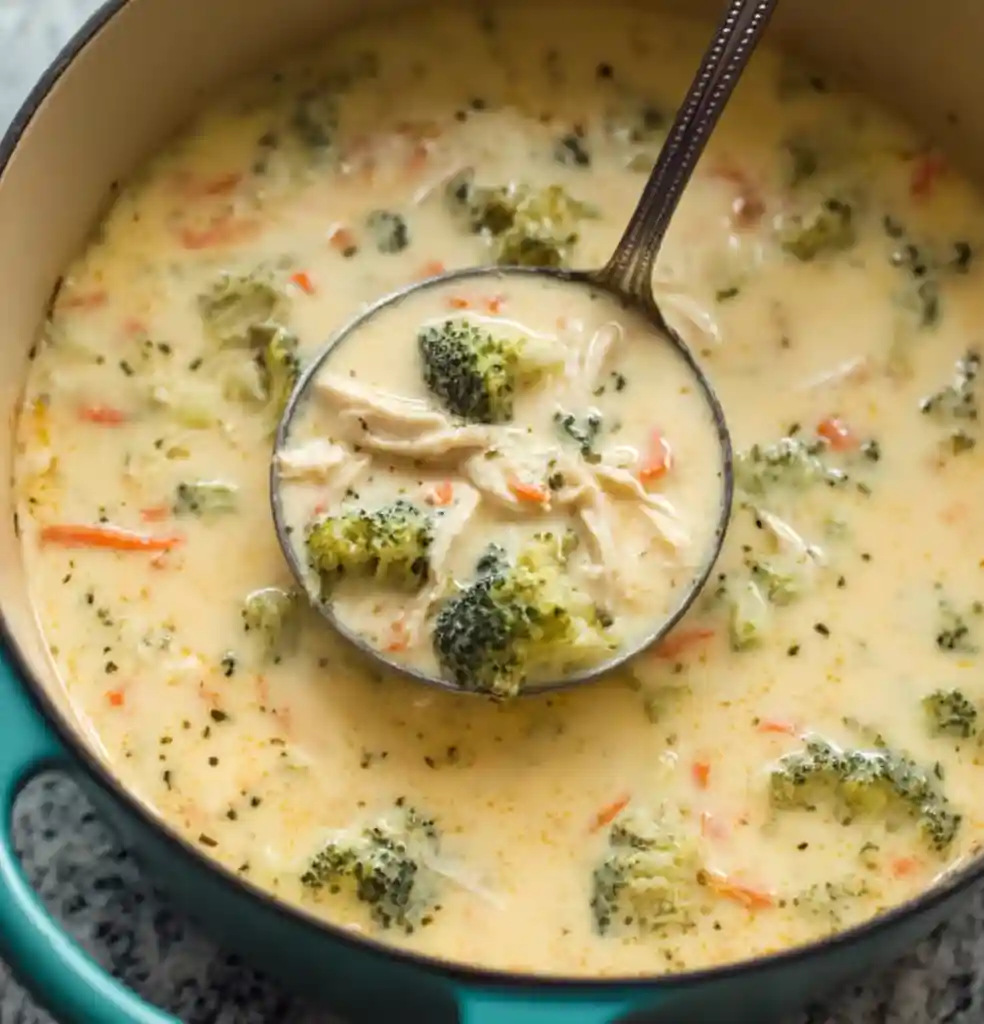How many calories are in 2 eggs? This common question matters more than you might think. Eggs are a staple in many diets worldwide, scrambled, boiled, or poached and they’re packed with nutrients that fuel your day.
Table of Contents
Why Knowing the Calorie Content of Eggs Matters
Understanding the calorie content of foods, including eggs, plays a significant role in maintaining a balanced and healthy diet. Popular for their nutritional value and low-calorie count, eggs are a versatile choice in many meals. If you’re exploring other versatile ingredients for balanced meals, check out these low-calorie lunch recipes.
The Nutritional Value of Eggs as a Staple Food
Often referred to as a “superfood,” eggs are rich in essential nutrients. Packed with high-quality protein, vitamins, and minerals such as Vitamin D, Vitamin B12, and choline, they support muscle development, brain health, and overall well-being. Additionally, their relatively low-calorie content makes them ideal for those seeking nutrient-dense food options.
For dinner inspiration using eggs, consider these creative egg recipes for dinner.
How the Calorie Count of Eggs Helps in Diet Planning?
Calorie awareness is fundamental for anyone looking to achieve specific dietary goals, such as weight loss, maintenance, or muscle gain. Knowing the calorie content of foods helps you make informed decisions about portion sizes and meal composition. Since eggs are a common ingredient in various meals, understanding their caloric contribution can aid in structuring a diet that aligns with your health objectives.
By knowing the calorie count of two eggs, you can enjoy their nutritional benefits while staying within your calorie limits-whether you’re aiming for a hearty breakfast or a light snack.
Nutritional Value of Eggs: Calories and Nutrients
Eggs are not only delicious but also an excellent source of essential nutrients. From macronutrients to vitamins and minerals, eggs contribute significantly to a balanced diet.
How Many Calories Are in 2 Eggs? Macronutrient Breakdown
Eggs are a powerhouse of macronutrients:
- Protein: Eggs are rich in high-quality protein, providing about 6 grams per large egg. This protein contains all nine essential amino acids, making eggs a complete protein source.
- Fat: A large egg contains around 5 grams of fat, primarily healthy unsaturated fats. A smaller portion comes from saturated fat.
- Carbohydrates: Eggs are extremely low in carbs, with less than 1 gram per egg, making them suitable for low-carb diets.
To incorporate protein-rich meals into your routine, you can explore these breakfast sausage recipes.
Vitamins and Minerals in Eggs
Eggs are loaded with vital nutrients:
- Vitamins: They are a good source of Vitamin D (important for bone health), Vitamin B12 (for energy and nerve function), and Vitamin A (for vision and immunity). Eggs also contain smaller amounts of Vitamin E, K, and B6.
- Minerals: Eggs provide essential minerals such as phosphorus, selenium, and small amounts of iron, zinc, and calcium.
- Choline: This nutrient is crucial for brain development and liver function, and eggs are one of the best sources.
Egg Sizes and Calorie Variations
The size and type of egg can influence its calorie content.
Large Eggs vs. Medium and Extra-Large Eggs
- Large Eggs: The standard size for most recipes, a large egg contains about 70 calories.
- Medium Eggs: Slightly smaller, these contain approximately 60 calories.
- Extra-Large Eggs: These offer around 80 calories each.
The size of the egg you choose will affect its nutritional contribution to your meal.
Impact of Egg Type (Chicken, Duck, Quail)
- Chicken Eggs: The most common, with a typical calorie count of 60-80 depending on size.
- Duck Eggs: Larger than chicken eggs, duck eggs can have around 90-100 calories each.
- Quail Eggs: Much smaller, each quail egg has about 14 calories, making them great for snacking or as garnishes.
How Cooking Methods Affect Calories in Eggs
Cooking not only enhances the flavor and safety of eggs but can also alter their calorie content.
Raw Eggs vs. Cooked Eggs
- Raw Eggs: Contain the same calories as cooked eggs but lack the flavor and safety of cooked options.
- Cooked Eggs: Cooking doesn’t add calories unless additional ingredients are included, but it improves digestibility and taste.
Popular Cooking Styles: Boiled, Fried, Scrambled
Boiled Eggs
Boiling adds no extra calories, making it one of the healthiest ways to enjoy eggs. A hard-boiled egg retains its original calorie count of around 70.
Fried Eggs
Frying eggs in oil or butter adds extra calories. For example:
- 1 teaspoon of butter adds 35 calories.
- 1 teaspoon of oil adds 40 calories.
Scrambled Eggs
Scrambled eggs are often made with milk or butter, increasing their calorie count:
- Adding 1 tablespoon of milk adds 10 calories.
- Using butter increases the count by at least 35 calories per teaspoon.

Adding Ingredients: Butter, Oil, or Milk
Enhancing the flavor of eggs with butter, oil, or milk adds calories to your dish. These additions should be considered when calculating the total caloric intake:
- Butter and oil add richness and texture.
- Milk creates creamier scrambled eggs but increases calorie content.
By understanding the nutritional breakdown, size variations, and impact of cooking methods, you can make informed choices about how to include eggs in your diet while meeting your health goals.
Health Benefits of Including Eggs in Your Diet
Eggs are a nutritional powerhouse, offering a wide array of health benefits that make them an excellent addition to any diet. From supporting muscle growth to enhancing brain function, eggs are versatile and impactful for overall well-being.
Protein for Muscle Growth and Repair
Eggs are a rich source of high-quality protein, which is essential for muscle growth and repair. Each egg contains all nine essential amino acids, making it a complete protein source. These amino acids are particularly important for athletes and individuals looking to maintain or build muscle mass.
Vitamins for Eye Health (Lutein and Zeaxanthin)
Eggs are a great source of lutein and zeaxanthin, two powerful antioxidants that play a critical role in eye health. These compounds help protect the eyes from damage caused by blue light and reduce the risk of age-related macular degeneration and cataracts.
Choline for Brain Function
Choline is a vital nutrient found in eggs that supports brain function and development. It is especially important for cognitive health, memory retention, and nerve signaling. For pregnant women, choline contributes to the healthy development of the baby’s brain and spinal cord.
Are Eggs Good for Weight Loss?
Eggs are often recommended for weight loss diets due to their unique ability to provide satiety while being low in calories. Here’s why they’re effective:
Eggs as a High-Satiety Food
Eggs are incredibly filling, thanks to their protein content and fat composition. Consuming eggs for breakfast, for example, can help reduce hunger and calorie intake throughout the day. Studies have shown that eating eggs as part of a balanced meal can enhance feelings of fullness, making it easier to stick to a calorie deficit.
How Egg Calories Compare to Other Protein Sources
When compared to other protein sources, eggs stand out for their balance of nutrients and cost-effectiveness:
- Eggs vs. Meat: While meat is also high in protein, eggs are lower in calories and easier to prepare.
- Eggs vs. Plant-Based Proteins: Eggs provide complete proteins, whereas many plant-based options lack one or more essential amino acids.
- Eggs vs. Dairy: Eggs are more nutrient-dense per calorie compared to some dairy products like cheese or yogurt.
Including eggs in your diet can help you achieve your weight loss and health goals while providing essential nutrients that support overall wellness.
Myths About Eggs and Calories
Eggs are a common food in many diets, but they’re often surrounded by misconceptions, particularly regarding their calorie content and health impact. Let’s debunk some of the most prevalent myths about eggs and calories.
Do Egg Whites Have Zero Calories?
One common myth is that egg whites have zero calories. While egg whites are very low in calories, they are not calorie-free. A single egg white contains approximately 17 calories, which is significantly less than the yolk but still contributes to your overall calorie intake. Despite being low in calories, egg whites are a rich source of protein and are often favored by individuals seeking to reduce fat and cholesterol in their diet.
Are All Egg Yolks “Unhealthy”?
Another widespread misconception is that egg yolks are unhealthy and should be avoided. This belief stems from the fact that egg yolks contain cholesterol and fat. However, research has shown that for most people, dietary cholesterol has a minimal effect on blood cholesterol levels.
Egg yolks are highly nutritious, providing:
- Vitamins: Such as Vitamin D, Vitamin B12, and Vitamin A.
- Minerals: Like iron, selenium, and phosphorus.
- Healthy Fats: Primarily unsaturated fats that support heart and brain health.
- Antioxidants: Lutein and zeaxanthin, which promote eye health.
While those with specific dietary restrictions or conditions like hypercholesterolemia may need to monitor their egg yolk consumption, for the general population, egg yolks are far from unhealthy. In fact, they provide essential nutrients that complement the protein-rich egg white.
By understanding the truth behind these myths, you can make informed decisions about incorporating eggs into your diet without unnecessary restrictions.
Using Eggs in Your Diet Effectively
Eggs are a versatile and affordable ingredient that can fit into almost any diet plan. Whether you’re meal prepping for the week or accommodating dietary restrictions, there are practical ways to make the most of eggs or find suitable alternatives.
Meal Prep Ideas Featuring Eggs
Incorporating eggs into your meal prep is a great way to ensure you have nutritious, protein-packed options ready to go. Here are some ideas:
- Hard-Boiled Eggs: Prepare a batch of hard-boiled eggs for an easy snack or addition to salads and sandwiches. They keep well in the fridge for up to a week.
- Egg Muffins: Whisk eggs with vegetables, cheese, or cooked meats, then bake in a muffin tin for a portable, reheatable breakfast or snack.
- Scrambled Egg Bowls: Cook scrambled eggs with a mix of sautéed vegetables, beans, or grains. Divide into meal prep containers for quick, balanced meals.
- Egg Salad: Combine chopped boiled eggs with Greek yogurt, mustard, and seasonings for a healthier take on egg salad. Use it as a sandwich filling or a dip for veggies.
- Shakshuka: Prepare a tomato-based sauce with spices and poach eggs in it. This dish can be made in bulk and reheated for flavorful, nutrient-rich meals.
Egg Alternatives for People with Allergies
For those who are allergic to eggs or follow a vegan diet, there are plenty of alternatives that can replace eggs in recipes:
- Chia Seeds or Flaxseeds: Mix 1 tablespoon of chia seeds or ground flaxseeds with 2.5 tablespoons of water to create a gel-like substitute, ideal for baking.
- Applesauce or Mashed Banana: Replace each egg in baking recipes with ¼ cup of applesauce or mashed banana for added moisture and sweetness.
- Silken Tofu: Use ¼ cup of silken tofu blended until smooth as a substitute for eggs in recipes like quiches or custards.
- Commercial Egg Replacers: Products like Ener-G or Bob’s Red Mill Egg Replacer are formulated to mimic the properties of eggs in various dishes.
- Aquafaba: The liquid from canned chickpeas can be whipped into a foam to replace egg whites in recipes like meringues or mousses.
Whether you include eggs in your meal prep or explore egg-free alternatives, these practical approaches ensure you can enjoy the nutritional benefits and culinary versatility that eggs-or their substitutes-offer.
Frequently Asked Questions
Eggs are a popular food choice, but they often spark questions about calories, health benefits, and everyday consumption. Below, we address some of the most common questions about eggs.
How Many Calories Are in 2 Boiled Eggs?
Two boiled eggs contain approximately 140 calories (70 calories per large egg). Boiling eggs is one of the healthiest cooking methods as it doesn’t add any extra fat or calories.
Do Organic Eggs Have More Calories Than Regular Eggs?
No, organic eggs generally have the same calorie content as regular eggs. The nutritional profile, including calories, is influenced more by the size of the egg than whether it is organic or conventional.
Are Brown Eggs Lower in Calories Than White Eggs?
No, the color of the eggshell (brown or white) has no impact on the calorie content or nutritional value. The difference lies only in the breed of the hen that laid the egg, not in its nutritional composition.
How Many Calories Are in 2 Fried Eggs?
Two fried eggs typically contain about 180 to 200 calories, depending on the cooking method. Frying in oil or butter adds additional calories:
- Oil: Adds approximately 40 calories per teaspoon.
- Butter: Adds around 35 calories per teaspoon.
What Are the Calories in Egg-Based Dishes Like Omelets?
The calorie content of an omelet varies based on added ingredients:
- A plain, two-egg omelet has about 140 calories.
- Adding cheese, vegetables, or meats can increase the calorie count significantly:
- Cheese: Adds about 100 calories per ounce.
- Vegetables: Low-calorie options like spinach or peppers add minimal calories.
- Meats: Cooked bacon or sausage can add 100-150 calories per serving.
Is It Okay to Eat Eggs Every Day?
Yes, for most people, eating eggs every day is perfectly safe and beneficial. Eggs are nutrient-dense and can fit into a healthy diet. However:
- Those with specific health conditions, like hypercholesterolemia, may need to limit egg yolk intake.
- Balancing eggs with other protein sources ensures a varied and nutrient-rich diet.
By addressing these frequently asked questions, you can make informed decisions about including eggs in your daily meals while understanding their calorie content and health impacts.
Conclusion:Understanding Egg Calories in the Context of a Healthy Diet
Eggs are a nutrient-dense and versatile food that fits well into almost any dietary plan. With their relatively low calorie count and high protein content, eggs provide sustained energy and satiety, making them an excellent choice for those aiming to manage weight, build muscle, or simply eat healthily. Whether boiled, scrambled, or incorporated into dishes, understanding the caloric and nutritional profile of eggs can help you make informed dietary choices that align with your health goals.
Eggs also offer essential vitamins, minerals, and antioxidants that contribute to overall well-being, from supporting brain and eye health to aiding in muscle repair. By tailoring portion sizes, cooking methods, and meal compositions, you can maximize the benefits of eggs while maintaining a balanced diet.

Final Thoughts on the Nutritional Value of Eggs
Eggs are more than just a source of protein-they are a powerhouse of nutrition. Their unique combination of essential nutrients, affordability, and culinary versatility makes them a staple in diets worldwide. Dispelling common myths and understanding how egg size, type, and preparation methods affect their calorie count enables you to incorporate them confidently into your meals.
Ultimately, eggs are an excellent example of how simple, natural foods can have a profound impact on health. Whether enjoyed daily or occasionally, eggs remain one of the most accessible and nutritious foods available, supporting a variety of dietary needs and lifestyles.


















